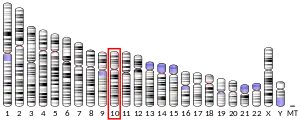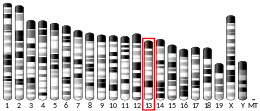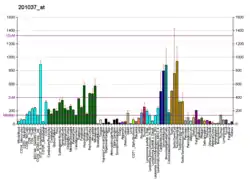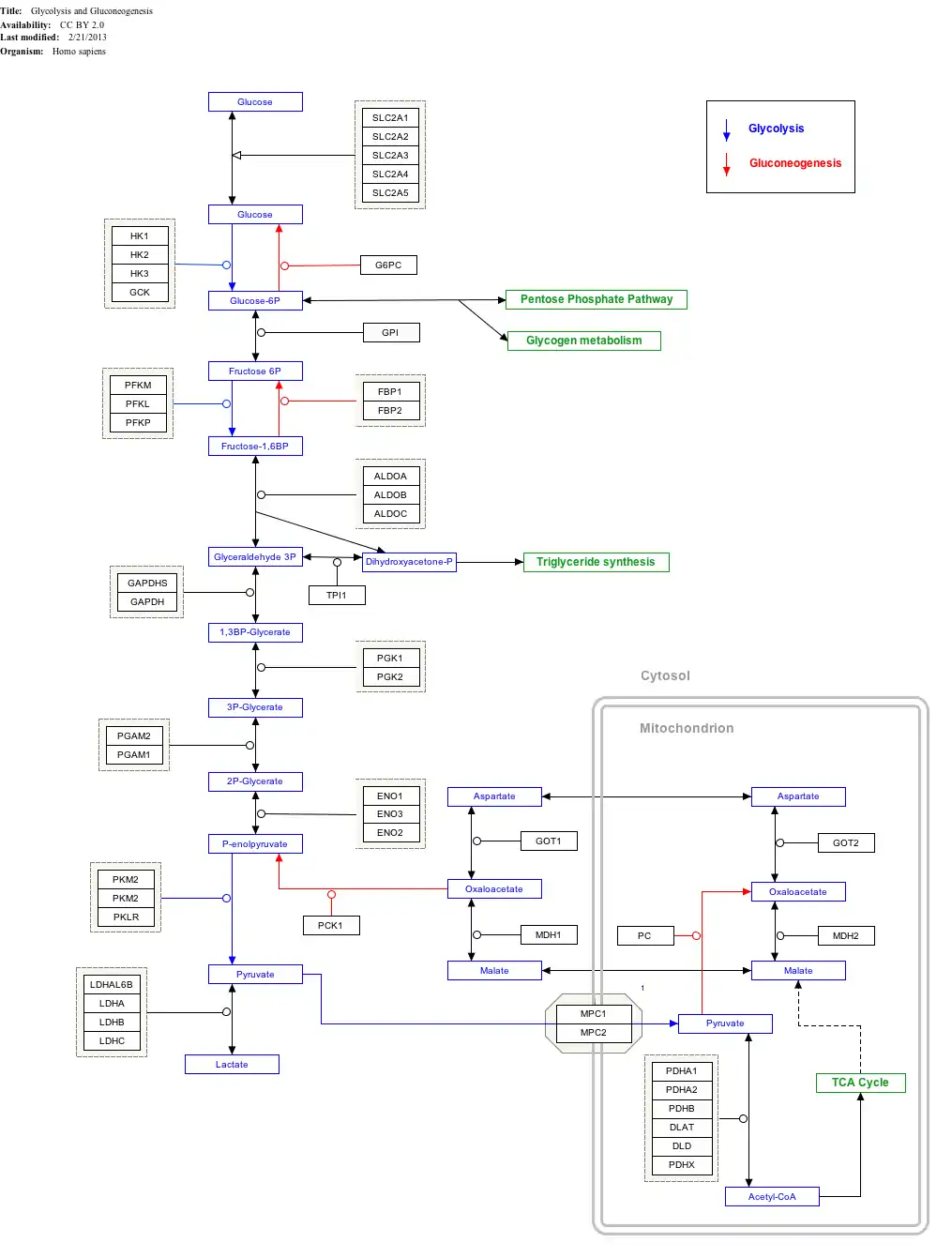PFKP
Phosphofructokinase, platelet, also known as PFKP is an enzyme which in humans is encoded by the PFKP gene.[5]
Function
The PFKP gene encodes the platelet isoform of phosphofructokinase (PFK) (ATP:D-fructose-6-phosphate-1-phosphotransferase, EC 2.7.1.11). PFK catalyzes the irreversible conversion of fructose 6-phosphate to fructose 1,6-bisphosphate and is a key regulatory enzyme in glycolysis. The PFKP gene, which maps to chromosome 10p, is also expressed in fibroblasts. See also the muscle (PFKM) and liver (PFKL) isoforms of phosphofructokinase, which map to chromosomes 12q13 and 21q22, respectively. Full tetrameric phosphofructokinase enzyme expressed in platelets can be composed of subunits P4, P3L, and P2L2.[5][6]
Interactive pathway map
Click on genes, proteins and metabolites below to link to respective articles.[§ 1]
- The interactive pathway map can be edited at WikiPathways: "GlycolysisGluconeogenesis_WP534".
References
- GRCh38: Ensembl release 89: ENSG00000067057 - Ensembl, May 2017
- GRCm38: Ensembl release 89: ENSMUSG00000021196 - Ensembl, May 2017
- "Human PubMed Reference:". National Center for Biotechnology Information, U.S. National Library of Medicine.
- "Mouse PubMed Reference:". National Center for Biotechnology Information, U.S. National Library of Medicine.
- "Entrez Gene: PFKP phosphofructokinase, platelet".
- Vora S (April 1981). "Isozymes of human phosphofructokinase in blood cells and cultured cell lines: molecular and genetic evidence for a trigenic system". Blood. 57 (4): 724–32. doi:10.1182/blood.V57.4.724.724. PMID 6451249.
Further reading
- Meienhofer MC, Lagrange JL, Cottreau D, et al. (1979). "Phosphofructokinase in human blood cells". Blood. 54 (2): 389–400. doi:10.1182/blood.V54.2.389.389. PMID 156568.
- Kahn A, Meienhofer MC, Cottreau D, et al. (1979). "Phosphofructokinase (PFK) isozymes in man. I. Studies of adult human tissues". Hum. Genet. 48 (1): 93–108. doi:10.1007/bf00273280. PMID 156693. S2CID 23300861.
- Morrison N, Simpson C, Fothergill-Gilmore L, et al. (1992). "Regional chromosomal assignment of the human platelet phosphofructokinase gene to 10p15". Hum. Genet. 89 (1): 105–6. doi:10.1007/BF00207053. PMID 1533608. S2CID 42022687.
- Simpson CJ, Fothergill-Gilmore LA (1991). "Isolation and sequence of a cDNA encoding human platelet phosphofructokinase". Biochem. Biophys. Res. Commun. 180 (1): 197–203. doi:10.1016/S0006-291X(05)81276-8. PMID 1834056.
- Nakajima H, Noguchi T, Yamasaki T, et al. (1987). "Cloning of human muscle phosphofructokinase cDNA". FEBS Lett. 223 (1): 113–6. doi:10.1016/0014-5793(87)80519-7. PMID 2822475. S2CID 42849336.
- Eto K, Sakura H, Yasuda K, et al. (1994). "Cloning of a complete protein-coding sequence of human platelet-type phosphofructokinase isozyme from pancreatic islet". Biochem. Biophys. Res. Commun. 198 (3): 990–8. doi:10.1006/bbrc.1994.1141. PMID 8117307.
- Bonaldo MF, Lennon G, Soares MB (1997). "Normalization and subtraction: two approaches to facilitate gene discovery". Genome Res. 6 (9): 791–806. doi:10.1101/gr.6.9.791. PMID 8889548.
- Adam GC, Sorensen EJ, Cravatt BF (2003). "Trifunctional chemical probes for the consolidated detection and identification of enzyme activities from complex proteomes". Mol. Cell. Proteomics. 1 (10): 828–35. doi:10.1074/mcp.T200007-MCP200. PMID 12438565.
- Strausberg RL, Feingold EA, Grouse LH, et al. (2003). "Generation and initial analysis of more than 15,000 full-length human and mouse cDNA sequences". Proc. Natl. Acad. Sci. U.S.A. 99 (26): 16899–903. doi:10.1073/pnas.242603899. PMC 139241. PMID 12477932.
- Ota T, Suzuki Y, Nishikawa T, et al. (2004). "Complete sequencing and characterization of 21,243 full-length human cDNAs". Nat. Genet. 36 (1): 40–5. doi:10.1038/ng1285. PMID 14702039.
- Navarro-Lérida I, Martínez Moreno M, Roncal F, et al. (2004). "Proteomic identification of brain proteins that interact with dynein light chain LC8". Proteomics. 4 (2): 339–46. doi:10.1002/pmic.200300528. PMID 14760703. S2CID 8868600.
- Beausoleil SA, Jedrychowski M, Schwartz D, et al. (2004). "Large-scale characterization of HeLa cell nuclear phosphoproteins". Proc. Natl. Acad. Sci. U.S.A. 101 (33): 12130–5. doi:10.1073/pnas.0404720101. PMC 514446. PMID 15302935.
- Gerhard DS, Wagner L, Feingold EA, et al. (2004). "The Status, Quality, and Expansion of the NIH Full-Length cDNA Project: The Mammalian Gene Collection (MGC)". Genome Res. 14 (10B): 2121–7. doi:10.1101/gr.2596504. PMC 528928. PMID 15489334.
- Rush J, Moritz A, Lee KA, et al. (2005). "Immunoaffinity profiling of tyrosine phosphorylation in cancer cells". Nat. Biotechnol. 23 (1): 94–101. doi:10.1038/nbt1046. PMID 15592455. S2CID 7200157.
- Hannemann A, Jandrig B, Gaunitz F, et al. (2005). "Characterization of the human P-type 6-phosphofructo-1-kinase gene promoter in neural cell lines". Gene. 345 (2): 237–47. doi:10.1016/j.gene.2004.11.018. PMID 15716112.
- Beausoleil SA, Villén J, Gerber SA, et al. (2006). "A probability-based approach for high-throughput protein phosphorylation analysis and site localization". Nat. Biotechnol. 24 (10): 1285–92. doi:10.1038/nbt1240. PMID 16964243. S2CID 14294292.
- Ewing RM, Chu P, Elisma F, et al. (2007). "Large-scale mapping of human protein–protein interactions by mass spectrometry". Mol. Syst. Biol. 3 (1): 89. doi:10.1038/msb4100134. PMC 1847948. PMID 17353931.
- Martínez-Costa OH, Sánchez-Martínez C, Sánchez V, Aragón JJ (2007). "Chimeric phosphofructokinases involving exchange of the N- and C-terminal halves of mammalian isozymes: implications for ligand binding sites". FEBS Lett. 581 (16): 3033–8. doi:10.1016/j.febslet.2007.05.059. PMID 17544406. S2CID 20271498.
External links
- Overview of all the structural information available in the PDB for UniProt: Q01813 (Human ATP-dependent 6-phosphofructokinase, platelet type) at the PDBe-KB.
This article incorporates text from the United States National Library of Medicine, which is in the public domain.






